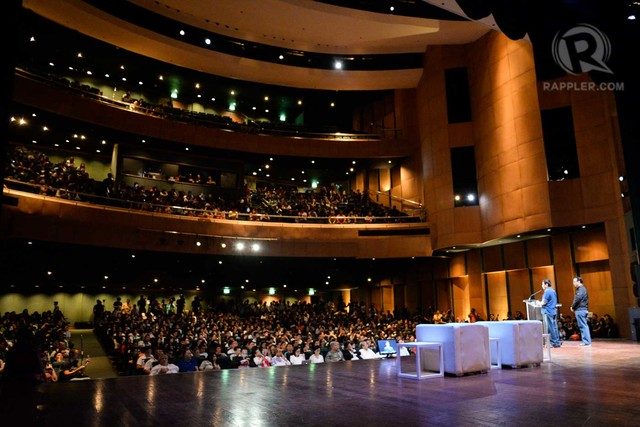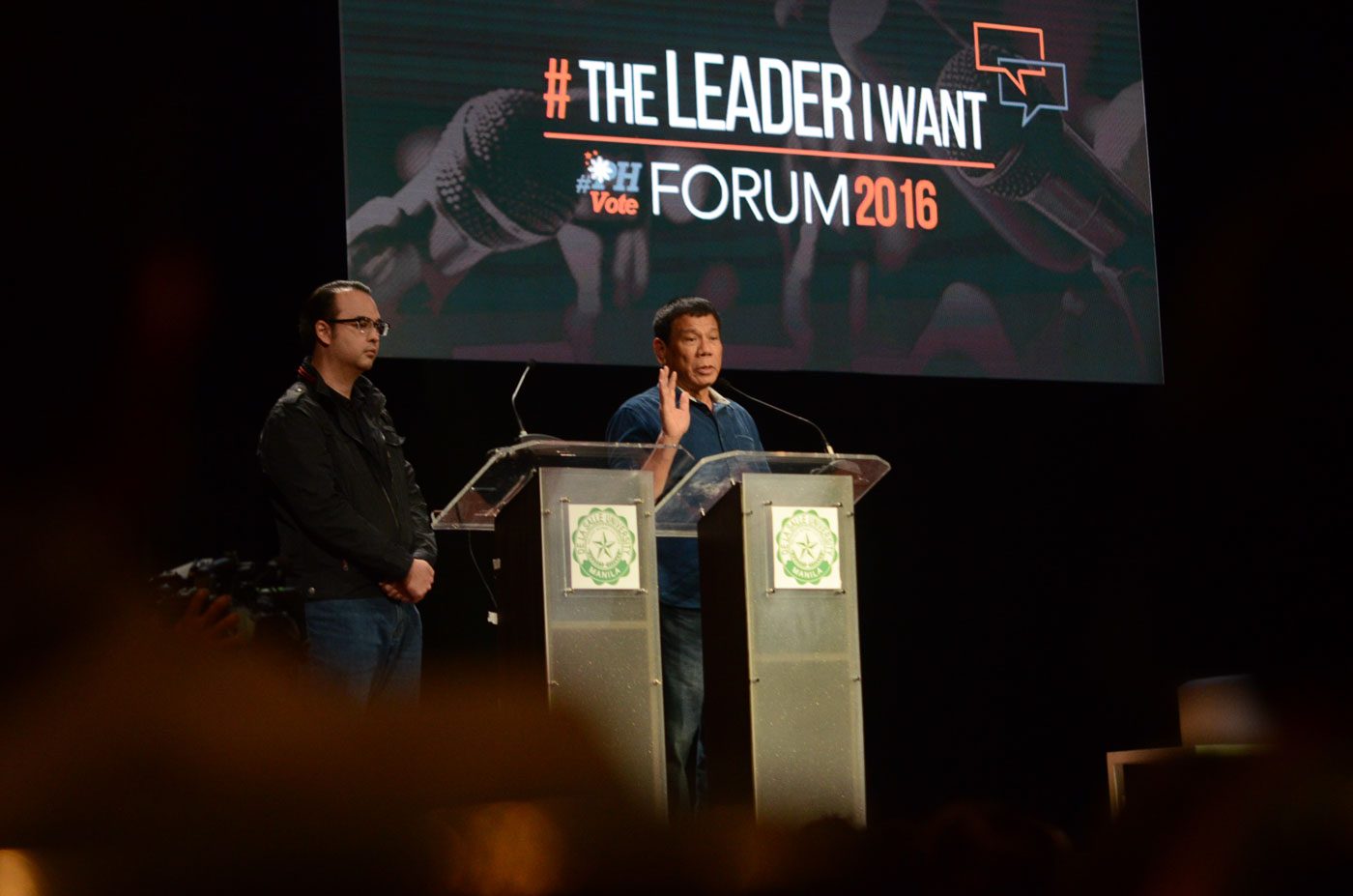SUMMARY
This is AI generated summarization, which may have errors. For context, always refer to the full article.

On January 20, Rappler and its media partners DZRH-MBC, Media ng Bayan-PTV4, road-blocked up to 3 hours of airtime on nearly 200 radio and television stations across the Philippines to help give candidates for the 2016 elections a chance to present their platforms.
After all, given the world’s challenges, we felt a need to move the public discourse away from the daily grind of controversial news clips and give the men and women running for the Philippines’ top posts a chance to face the public they want to serve.
Nearly 2,000 people filled the auditorium at De La Salle University, which had given their students the afternoon off so they could watch and participate. Before we began, I took the microphone and asked who were registered to vote, and it seemed nearly three-quarters of the audience I could see raised their hands.
Add to this the nearly 40 viewing parties across the Philippines with AMA schools, other DLSU campuses, Lyceum – as well as the reach of Facebook and Twitter. We felt we could get a thoughtful discussion going. As the moderator, my focus was getting to the substance and highlighting some of the key issues the next leaders would have to face.
I was involved in inviting the presidential and vice-presidential candidates. While initially, all but one tandem pencil-booked the event in their calendars, I was disappointed when the weekend before, we received 3 cancellations in 3 days – the last one the night before. All but one tandem, Duterte-Cayetano, decided this was worth their time, and they postponed a crucial scheduled signing to be there.

Davao Mayor Rody Duterte and his running mate, Senator Alan Cayetano, seemed thrilled to have the stage to themselves. (READ: #TheLeaderIWant trends, supporters take advantage)
Why would the other candidates give up such an opportunity?
There are at least four reasons, each of which presents both a threat and an opportunity for them in the months leading to May 9.
1. Nothing is certain in the 2016 campaigns.
It’s hard to be a politician hitting the campaign trail in 2016.
Old campaign rules – hitting the road, pressing the flesh, getting as many political ads as you can afford on television, harnessing a party’s political machinery to deliver votes – well, these are no longer enough.
There’s a new generation, and that’s saying a lot in a country where the median age of our 100 million people is 23 years old.
There’s an added twist.
This generation is coming of age at a time when technology is disrupting every industry in the world, including governance and politics.
Will these elections become our equivalent of the 2008 US elections when technology and social media catapulted a little-known senator to the presidency?
Is any candidate poised to take advantage of this technology today?
What does this generation want? Comelec says at least 39% of the registered voters are youth, making that a coveted demographic, but they have notoriously been absent at the polls.
When I asked the students at La Salle whether they were going to vote, we heard a resounding “yes.”
Will that translate to action? Will they break the patterns of the past? And if they do, is that enough to overturn old power structures in our country?
So far, if we go by statistical surveys, the December surveys putting Vice President Jejomar Binay in first place reinforce the notion that the old tried-and-tested campaign methods may still be enough: press the flesh, solidify and pull together physical networks, etc.
That’s a simplistic assumption though.
Scratch deeper, and you find that context and recent events explain this – not just campaign sorties. The recovery in Binay’s ratings were also because of other factors: Grace Poe’s disqualification cases which stopped her momentum in December; Mar Roxas’ inability to sustain his momentum (even though he’s been doing the rounds like Binay); and the aftermath of Duterte’s cursing the Pope and his first real taste of how a presidential campaign is run at the national level.
Binay’s strategy of silence, which began after corruption charges caused his ratings to decline, tackles just one aspect of the campaign, but he benefitted from the cases against Poe (which other pollsters predicted). Despite that, he hasn’t fully recovered his base.
If you go by Rappler’s informal surveys, the most engaged and active supporters in terms of evangelizing for their candidate on social media want to see Duterte for president.
2. No room for mistakes in a tight race.
The presidential race is too close to call. Anyone can win it, although some say this is Mar Roxas’ to lose. The vice-presidential race is as tight and perhaps even more exciting.
In races like these in the Philippines, forums and debates are difficult because one mistake can cost you the race.
Political handlers still remember the Harapan debates in 2010 which pitted the top two for vice president against each other: Senator Loren Legarda vs then survey leader Mar Roxas. Their performance ignited a storm on the then fledgling social media and effectively sidelined Legarda, who up to the debate was second to Roxas in the surveys. She was never able to recover.
That somehow helped dark horse Jejomar Binay, who had a relatively strong showing in the forum, to race up and ultimately overtake Roxas.
Seeing how much was at risk and the immediate impact of the debate, all presidential candidates subsequently declined invitations for similar formats.
The lesson, I had hoped, was that candidates needed to hone their platforms and debate skills, but the takeaway from that for our politicians seemed to be to avoid them at all costs.
There is just too much at stake.
Until today, political campaigns try to exercise tight control over format and questions.
It’s a disservice to both the politicians, who must develop these skills, and to the public, which could be guided by a discussion on issues and see how their candidates perform under pressure.
Real debates show us the candidate’s facts-on-file responses: unpolished and without aides and advisers. What’s the extent of their knowledge of issues and history? How do they react under pressure? What kind of values do they show? Ultimately, the crucible of a debate often shows character and shows us what kind of person we are electing into office.
3. Is social media a plus or a minus?
The 2013 elections for senator showed that social media could take a candidate down one or two positions in the case of now Senator Cynthia Villar, who faced a viral negative reaction on the issue of nurses.
Since 2013, Internet penetration moved from about 30% to 44% in 2015, plus smartphone penetration increased more than 200% in 2013 alone and is expected to hit 29.9% in 2016.
There are about 42 million Filipino accounts on Facebook in 2016, and as early as 2012, SocialBakers estimated that 5 Filipinos open a Facebook account every minute.
Given that the top demographic on social media are 18-35 years old, the exact same 39% of registered voters pinpointed by Comelec, will social media engagement translate to votes?
These elections may very well mark the tipping point for the Philippines, that so many candidates are investing in social media. Still inevitably, the easy investment is in trying to game systems – harnessing bots and other electronic tricks that could well turn the Internet into a wasteland.
So far, we haven’t seen any sophisticated systems that merge online and offline action like Barack Obama did in 2008.
Social media is a powerful tool, but it won’t mean anything if it’s not utilized in any meaningful way.
4. Upcoming Comelec debates
Comelec is helping sponsor 3 presidential and 1 vice presidential debates, although these are largely left in the hands of the media conglomerates.
So far, it seems all candidates have said they will attend, but the risks remain.
Each step, including topics of questions and access, are being carefully negotiated.
Having these ahead meant candidates felt they could mitigate the early risk of not attending last week’s forum.
So who won #TheLeaderIWant last week?
It wasn’t the public – people like me, hoping to see all the candidates so I could make my choice. There was a palpable thirst for real information: platforms and clear answers to questions that matter.
During the 2 hours Duterte and Cayetano were onstage, I felt wave after wave wash through the audience as they answered questions in thoughtful ways. They had the time to convince, and they acted like a tandem.
If you have the ambition to run for the highest offices in the country, you’ve got to let go of controlled conditions. It comes with the job.
In order to win, you’ve got to show up. – Rappler.com
Add a comment
How does this make you feel?
There are no comments yet. Add your comment to start the conversation.